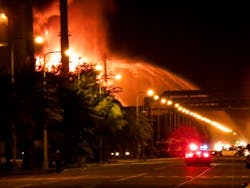“Gov’t furious over Formosa plant fire” shouts a headline in the May 14, 2011 edition of The China Post.
“The government yesterday blamed insufficient safety inspection for the latest fire that hit the Formosa Plastics Group's naphtha cracker complex in southern Taiwan—the third such accident there in 10 months,” states the newspaper report. “The economics ministry said the government task force formed last September in the wake of the fires at Formosa Plastics' complex at Mailiao, Yunlin County was short of manpower to monitor the safety of operation there. Mailiao's internal industrial safety staff was insufficient, the ministry said, as it made public preliminary findings of an investigation into the nine-hour fire that broke out Thursday evening.”
The Formosa Plastics Group (FPG) consists of Formosa Plastics Corp., Nan Ya Plastics Corp., Formosa Chemicals & Fibre Corp. and other subsidiaries engaged in oil refining, petrochemicals and other industries. Starting in 2010, several fire incidents occurred in FPG refineries, leading the Taiwanese governmental authority to order a shutdown of more than 50 plants within a year in the Formosa No. 6 Naphtha Cracking Project Mailiao industrial park.
Before production could resume at the closed plants, FPG needed to perform safety inspections under the supervision of an international third-party organization. FPG chose TÜV Rheinland Taiwan Ltd., a division of the140-year-old safety organization TÜV Rheinland, based in Germany. The goal: perform plant safety assessments for 13 petrochemical and power plants between December 2011 and September 2012 so the plants could be brought back online.
To accomplish this, TÜV Rheinland put together a team of more than 50 professionals pulled from its global organization, as well as from local and international partners. That gave FPG the personnel and the processes it needed to get its plants back online safely.
Assessment framework
According to TÜV Rheinland’s Mr. Andrew H.C. Kao, who was directly involved with the project, the framework for the plant safety assessment was provided by the U.S. OSHA regulation 29 CFR 1910.119 Process Safety Management (PSM) guideline, because this safety specification had already been established in the plants. Accordingly, the tasks of TÜV Rheinland covered all 14 elements of PSM including process hazards analysis (PHA) and mechanical integrity (MI) inspection during operation and shutdown, which was based on risk-based inspection guidelines of the American Petroleum Institute (API).
According to Kao, the assessment process was divided into three phases: the preliminary audit of the PSM system, on-site verification of MI implementation, and final compliance validation.
Since the initial fires were not caused by the automation systems, but by piping leaks and corrosion rupture on vessels, TÜV Rheinland inspectors conducted the necessary document reviews and inspection related to API 510 / 570 / 653 / 580 / 571.
Inspection for Mechanical Integrity (MI), which is one of 14 elements of PSM, covered key systems in MI including:
- Pressure vessels and storage tanks
- Piping
- Relief and vent system devices
- Emergency shutdown system (ESD)
- Controls
- Rotary machinery.
An inspection of electrical equipment was also added because the governmental committee requested this additional item, said Kao.
During the assessment, TÜV Rheinland experts witnessed the on-stream and off-stream inspections for three months at each plant, said Kao. “In addition, they reviewed all inspection plans and verified the improvements and corrections to the system management of PSM and the implementation of equipment inspection,” he said.
During off-stream (shutdown) inspections, “we witness the inspections and tests that plant engineers executed on all instruments and control systems (like DCS) according to prevention maintenance plans and overhaul plans,” said Kao.
During on-stream, operational inspections, “we witness their daily operation and trends in the control room,” said Kao. This also includes emergency shutdown system (ESD) or safety integrated system (SIS) on-line trip tests on critical process systems, he added.
Conclusions
The work was completed on schedule and more than 3,000 findings and recommendations were handed to FPG regarding the 13 plants.
“Based on these findings, the safety of pressure vessels, the piping, the safety control system and explosive-proof electrical equipment were improved to the acceptable level,” Kao said.
At the final review meeting in September 2012, the authority and the committee approved the future operation of the 13 FPG plants based on the reports and presentation prepared by TÜV Rheinland. Also, “because of the governmental agency's trust in and satisfaction with the performance of TÜV Rheinland, the authority recommended TÜV Rheinland to the Taiwan Industrial Safety Association to address these extremely important issues to local petrochemical industry sectors, governmental officers and institutes in December 2012,” added Kao.
TÜV Rheinland makes available its safety assessment services to all petrochemical plants around the world. Interested users can learn more at www.tuv.com/plant-safety.

